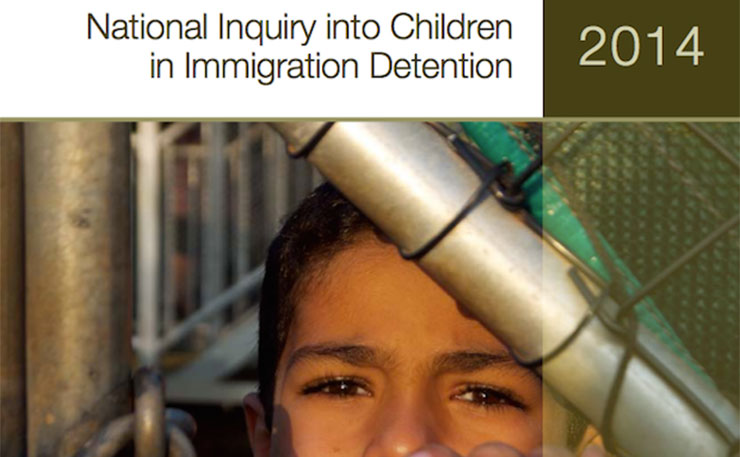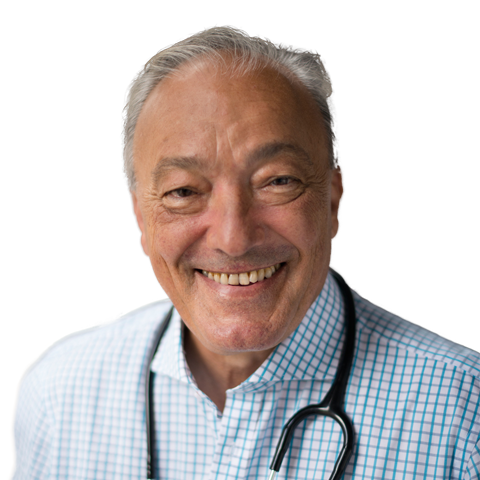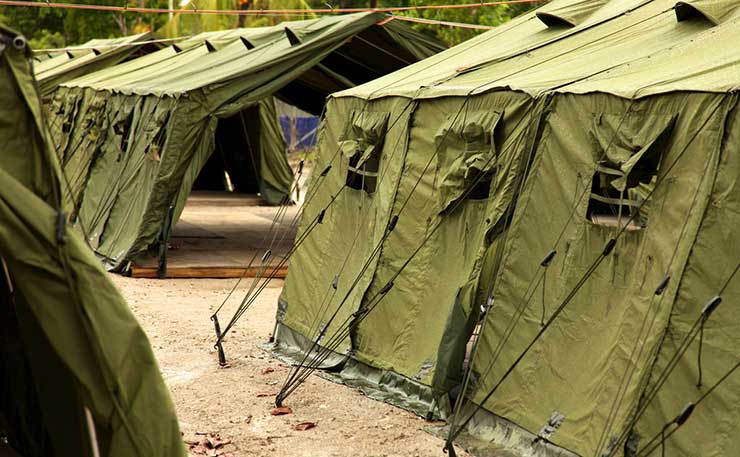After speaking out against Australia’s ‘concentration camps’, the candidate was forced to back away from his comments. There was no need to do so, writes Michael Brull.
On Wednesday last week, Labor candidate for Macarthur Michael Freelander called Australia’s detention centre on Manus Island a “concentration camp”. For those who missed it, the story is this. Freelander said “I would hate to think we would be torturing children in a place like Manus Island — in a concentration camp and I could never support that. On a personal basis I believe it should be closed down and they should be processed in Australia. What we’re doing is cruel.”
Murdoch’s online tabloid screamed in its headline that this was a Nazi slur. The Liberals joined the attack. Foreign Minister Julie Bishop said “For a candidate to try and draw a parallel between any action of an Australian government and the Holocaust and Nazi Germany is, quite frankly, shocking… He should apologise.” Bill Shorten immediately distanced himself from the comments. The Executive Council of Australian Jewry President Robert Goot voiced similar concerns. It was inappropriate because “The words ‘concentration camp’ will be associated by many people with the horrors of the Nazi regime.”
Goot’s comments hinted at more historical knowledge than that possessed by the tabloids and politicians. While concentration camps might be associated with the Nazis by many people, that does not mean that the Nazis invented them.
Freelander swiftly surrendered to the bipartisan pressure. He offered an apology to J-Wire: “As a member of the Jewish community I’m deeply aware that I chose poor words yesterday. I’m sorry for the offence I caused to my community.”
But if the words were poor, it was not because they offend Jews, but because they offend the consensus of the major political parties. His words shouldn’t have been controversial. He was right. We are torturing children. And they are in concentration camps.
 Torturing Children: No Longer A Matter Of Controversy
Torturing Children: No Longer A Matter Of Controversy
This was apparently an uncontroversial part of what Freelander said. While accusing our government of torturing children should seem like a rather grave accusation, in fact, no one cared. The outrage was all over whether or not he had compared us to the Nazis, which was considered the outrageous part.
For what it is worth, yes, we are torturing children. Graeme McGregor, Amnesty International’s refugee campaign coordinator, wrote of our detention facility on Manus Island: “The living conditions in the facility are hot, extremely cramped and poorly ventilated. There is no privacy. The conditions in one dormitory were so bad that Amnesty International considers the accommodation of asylum seekers there a violation of the prohibition on torture and other ill-treatment.”
While there are no longer children on Manus, under Labor’s offshore processing scheme there were.
And it is not just Manus Island. Last year, the Human Rights Commission issued its now famous report on children in immigration detention, Forgotten Children. It observed that “Children on Nauru are suffering from extreme levels of physical, emotional, psychological and developmental distress.” The Commission found that we had breached, or had “serious concerns” that we had breached, various aspects of international law. These included this provision from the Convention of the Rights of the Child: “No child shall be subjected to torture or other cruel, inhuman or degrading treatment or punishment. Neither capital punishment nor life imprisonment without possibility of release shall be imposed for offences committed by persons below eighteen years of age.”
Triggs didn’t come out and say we’re torturing children. But she expressed concern that children might be subjected to torture or other cruel, inhuman or degrading treatment.
The Department of Immigration’s own top doctor acknowledges the harm detention does to children, while an independent ‘at risk’ evaluation using a standard paediatric assessment found children in the Wickham Point Detention Centre returned the worst results ever recorded.
I want to pause before moving on at this point. How sick and depraved is a country’s political discourse when accusations of torturing children don’t even register as challenging or controversial? How far gone is Australia when the two major parties who designed that policy don’t even think to feign anger at that charge?
Hypocrisy would at least indicate shared values. In Australia, torturing children is bipartisan wisdom. Most politicians from the major parties don’t even rise to the moral level of hypocrisy.
The Meaning Of ‘Concentration Camp’
As noted, Murdoch journalists were quick to claim that “concentration camps” meant Nazi. Bishop went further, claiming that this was a Holocaust reference. This is either sensationalism or ignorance.
In fact, concentration camps were used by the Spanish as a strategy of counter-insurgency in the late 19th century in Cuba. They were also used the British during the Boer War. When trying to separate guerrillas from the civilian population they came from, the civilians were swept up by the army and “concentrated”. Into camps. The camps were inhumane, as was more or less standard in wars conducted 100 years ago, as indeed are all wars. Over 10 per cent of black Africans held in the concentration camps died, as did up to 28,000 white civilians.
The concentration camps of the Boer War gave rise to one of the most famous anti-imperialist zingers of modern times. Responding to the official government line that they weren’t at war, Sir Henry Campbell-Bannerman commented: “When is a war not a war? When it is carried on by methods of barbarism in South Africa.”
Concentration camps are typically defined as places where some category of undesirables are imprisoned (concentrated), sometimes with the added stipulation that they include inhumane conditions. They are usually associated with the Nazis, but that’s just because concentration camps were openly identified as such by old-fashioned imperialist powers. In the West we don’t learn much about the crimes of imperialism, and so we don’t hear about our concentration camps.
Wikipedia has a list of internment and concentration camps here. They are grouped together, because it is not particularly easy to distinguish them, other than by limiting the term “concentration camp” to the Nazis and official enemies. During World War 2, America sent Japanese people en masse to internment camps, and we interned Germans during the two World Wars.
What is an internment camp? Dictionary.com says “a prison camp for the confinement of enemy aliens, prisoners of war, political prisoners, etc.” What’s a concentration camp? “A guarded compound for the detention or imprisonment of aliens, members of ethnic minorities, political opponents, etc., especially any of the camps established by the Nazis prior to and during World War II for the confinement and persecution of prisoners.”
Sounds kind of similar, doesn’t it? So yes, I agree that we shouldn’t compare the camps on Manus Island to Auschwitz. But if, say, we were to call them internment camps, that would be more or less accurate, no? And if more people knew the history of concentration camps beyond the Nazis, perhaps they wouldn’t be shocked by comparisons to concentration camps either.

The Greater Good?
Freelander sounds like a decent guy. He’s been a paediatrician in Campbelltown Hospital in south-west Sydney for 32 years. He’s been the Head of Paediatrics there since 1990. He also lectures in medicine at Western Sydney University. It is in the nature of being a doctor – and a paediatrician at that – that he has helped people. As the Head of Paediatrics for decades, he presumably could have gotten a fancier job in a wealthier area. He seems like a humane man with a social conscience, who has demonstrated compassion for the vulnerable.
As Freelander backed down within a day, it seems his comments were more about his political inexperience as a life-long doctor, rather than a cynical stunt in a marginal seat.
I find it easy to believe he does care about asylum seekers. As a doctor, he is presumably aware of the many doctors who have spoken out about the cruelty of our asylum seeker policies.
And yet, he is willing to get on board with those policies. Freelander thinks the official policy of the ALP is to torture children in concentration camps. And as he candidly explained – even before his apology – he supports the official policy. After all, “sometimes you have to make decisions that go against the grain but support the greater good”.
That kind of reasoning is insane. Perhaps a case can be made that it is better to try to change the ALP from within. But to support the torture of children? For the greater good? How many children should we be willing to torture for the greater good? What is the greater good in this instance? Winning one seat in service of Bill Shorten?
Supporting torture “for the greater good” should be a scandal. That is not how doctors are supposed to calculate treatment. If we’re going to talk about the greater good, I think Dr Freelander would do a lot more good as a veteran doctor than as a morally compromised politician. It may not be in the Hippocratic Oath, but perhaps Freelander can instead follow a more traditional moral precept: first, do no harm.
Donate To New Matilda
New Matilda is a small, independent media outlet. We survive through reader contributions, and never losing a lawsuit. If you got something from this article, giving something back helps us to continue speaking truth to power. Every little bit counts.





